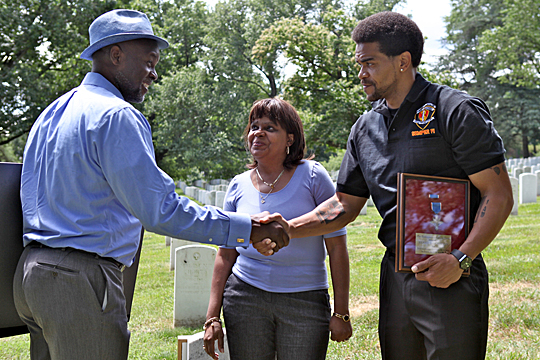A striking poster from the 1900s. A grave at Arlington National Cemetery. Three generations of decorated military members from one bloodline.

Tukufu Zuberi, left, met with UT student DeMarqus Townsend and Tara Johnson, descendants of one of the men honored in his World War I poster titled “Our Colored Heroes.”
It began with a phone call in April. Townsend’s mother, Toledoan Tara Johnson, was asked about a poster that depicted an African-American soldier in the fury of battle during World War I.
She knew the poster well, even has a copy in her Kansas City, Mo., business office. The image is based on an incident involving her grandfather, Henry Lincoln Johnson, a former member of the U.S. Army National Guard’s 369th Infantry, who fought heroically, yet died in his early 30s, penniless and unrecognized.
“The producers of ‘History Detectives’ said the host of the show had this poster he’d bought at an auction,” Johnson explained. “They wanted some feedback from the family about the events depicted on the poster and invited us to Arlington.”
Once producers learned Townsend, 32, is a Marine who’d fought in the First Battle of Fallujah, Afghanistan, in 2004, he was invited to join the taping.
Mother and son waited for “History Detectives” host Tukufu Zuberi at Henry Johnson’s gravestone in Arlington National Cemetery; they brought medals that had been awarded posthumously, including the Purple Heart and the Distinguished Service Cross from the U.S. government, as well as the Croix de Guerre, France’s highest national award.
“The host was surprised to see members of Henry Johnson’s family,” Townsend said. “He thought he was meeting a military official. We got to take his position on the show; usually guests give the host an object and get him to find the story behind it. This time, we had the answers to his poster.”
Highly unusual for its racial undertones reflecting its time, the poster depicts the savagery of battle, with Henry Johnson brandishing a knife and fallen German soldiers at his boots. The visual is based on an incident that occurred on a French battlefield in 1918. Ambushed by a German platoon, Johnson and fellow Allied infantryman Needham Roberts were injured by grenades and gunfire. Despite his injuries, Johnson repelled the Germans using only a bolo knife and a defective rifle.
 The taping at his great-grandfather’s grave was not Townsend’s first visit. His mother and grandfather, Herman Johnson — Henry’s son who grew up to be a Tuskegee Airman, noted businessman and civil rights activist — had spoken of Henry Johnson often. Such history factored into Townsend’s decision to enlist in the Marine Corps at age 21.
The taping at his great-grandfather’s grave was not Townsend’s first visit. His mother and grandfather, Herman Johnson — Henry’s son who grew up to be a Tuskegee Airman, noted businessman and civil rights activist — had spoken of Henry Johnson often. Such history factored into Townsend’s decision to enlist in the Marine Corps at age 21.
After he became a veteran himself, Townsend sought a kindred grace with the great-grandfather he’d never met.
“I went to his grave to have his spirit with me,” Townsend said. “Coming out of Fallujah and having been in combat myself, I found a lot of peace at Arlington.”
In the “History Detectives” taping, he and his mother spoke at length about Henry Johnson’s life after World War I. Branded “Black Death” for his tenacity in battle, Johnson returned to his native New York a war hero, but quickly discovered that racism trumped battlefield bravery.
“The host asked how we felt about my great-grandfather being a war hero, but being treated like he was not,” Townsend said. “A lot of his fellow soldiers served their country heroically, but came home and faced the same discrimination they endured when they left. It’s different for me; I have the [U.S. Department of Veterans Affairs] and other support that helped me transition out of a combative mind. My grandfather had neither that, nor a fair trade in society because of his skin color.”
Johnson said her grandfather’s legacy slowly has been revealed. Decades of pressure from family members and well-positioned friends have brought military accolades and civic recognition, but the family believes Henry Johnson has earned an additional milestone.
“There’s one medal that is given by the commander in chief, and that’s the Congressional Medal of Honor,” Townsend said. “I grew up hearing that my great-grandfather was an honorable man who performed with courage during the war. For President Obama to bestow the medal of honor would be the ultimate recognition.”
Henry Johnson’s application for the Congressional Medal of Honor is under consideration. The family has no timeline for when determination will be made.
“My grandfather was an ordinary man who did extraordinary things,” Johnson said. “If you live an honorable life, that’s supposed to be worth something. He didn’t get recognition when he was alive. I want to make sure he does [now].”
Although he is no longer an active duty Marine, the legacy of military service lingers in DeMarqus Townsend. A freshman at UT, he is studying psychology with the goal of opening a private practice to assist veterans returning from combat.
Townsend’s and Johnson’s recollections of Henry Johnson will be featured in the “Our Colored Heroes” segment of “History Detectives” on the PBS Bowling Green and Detroit affiliates Tuesday, Oct. 9, at 8 p.m.